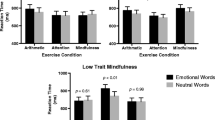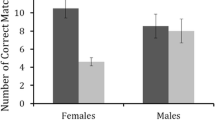Abstract
The impact of a 3-min state mindfulness exercise was investigated in recognition memory performance in order to test if memorial benefits would be found without long-term training. Four experiments (total N = 369) compared the effect of the exercise before encoding versus retrieval. False alarms decreased after a 3-min mindfulness exercise prior to retrieval whether the stimuli were words (experiment 1) or nonwords (experiment 2). When the mindfulness exercise occurred before encoding, there was no benefit on error rates (experiments 3 and 4). The results suggest that even a brief state mindfulness exercise can have immediate and positive effects on recognition memory performance. Implications for improving practical memory tasks such as test taking or eyewitness memory are discussed.
Similar content being viewed by others
References
Baird, B., Mrazek, M. D., Phillips, D. T., & Schooler, J. W. (2014). Domain-specific enhancement of metacognitive ability following meditation training. Journal of Experimental Psychology: General, 143, 1972–1979.
Bonamo, K. K., Legerski, J., & Thomas, K. B. (2015). The influence of a brief mindfulness exercise on encoding of novel words in female college student. Mindfulness, 6, 535–544.
Glanzer, M., & Adams, J. K. (1990). The mirror effect in recognition memory: data and theory. Journal of Experimental Psychology: Learning, Memory, & Cognition, 16, 5–16.
Hafenbrack, A. C., Kinis, Z., & Barsade, S. G. (2014). Debiasing the mind through meditation: mindfulness and the sunk-cost bias. Psychological Science, 25, 369–376.
Hammond, L., Wagstaff, G. F., & Cole, J. (2006). Facilitating eyewitness memory in adults and children with context reinstatement and focused meditation. Journal of Investigative Psychology and Offender Profiling, 3, 117–130.
Heeren, A., Van Broeck, N., & Philippot, P. (2009). The effects of mindfulness on executive processes and autobiographical memory specificity. Behavior Research and Therapy, 47(5), 403–409. doi:10.1016/j.brat.2009.01.017.
Hicks, J. L., & Marsh, R. L. (2000). Toward specifying the attentional demands of recognition memory. Journal of Experimental Psychology: Learning, Memory, & Cognition, 26, 1483–1498.
Lau, M. A., Bishop, S. R., Segal, Z. V., Buis, T., Anderson, N. D., Carlson, L., Shapiro, S., Carmody, J., Abbey, S., & Devins, G. (2006). The Toronto mindfulness scale: development and validation. Journal of Clinical Psychology, 62, 1445–1467. doi:10.1002/jclp.20326.
Levy, B. R., Jennings, P., & Langer, E. J. (2001). Improving attention in old age. Journal of Adult Development, 8(3), 189–192. doi:10.1023/A:1009546408665.
London, 2013. Mindfulness breathing space exercise. http://www.uvm.edu/∼CHWB/psych/?Page=exercises.html&SM=mindfulnessmenu.html
Morrison, A. B., Goolsarran, M., Rogers, S. L. & Jhu, A. P. (2014). Taming a wandering attention: short-form mindfulness training in student cohorts. Frontiers in Human Neuroscience, 7 (897). doi: 10.3389/fnhum.2013.00897
Mrazek, M. D., Franklin, M. S., Phillips, D. T., Baird, B., & Schooler, J. W. (2013). Mindfulness training improves working memory capacity and GRE performance while reducing mind wandering. Psychological Science, 24(5), 776–781. doi:10.1177/0956797612459659.
Nairne, J. S., VanArsdall, J. E., Pandeirada, J. S., Cogdill, M., & LeBreton, J. M. (2013). Adaptive memory: the mnemonic value of animacy. Psychological Science, 24(10), 2099–2105.
Paivio, A. (1973). Picture superiority in free recall: imagery or dual coding? Cognitive Psychology, 5, 176–206.
Rubin, D. C., & Friendly, M. (1986). Predicting which words get recalled: measures of free recall, availability, goodness, emotionality, and pronunciability for 925 nouns. Memory & Cognition, 14(1), 79–94. doi:10.3758/BF03209231.
Teper, R., & Inzlicht, M. (2014). Mindful acceptance dampens neuroaffective reactions to external and rewarding performance feedback. Emotion, 14, 105–114.
VanArsdall, J. E., Nairne, J. S., Pandeirada, J. S., & Blunt, J. R. (2013). Adaptive memory: animacy processing produces mnemonic advantages. Experimental Psychology, 60(3), 172–178. doi:10.1027/1618-3169/a000186.
Zeidan, F., Johnson, S. K., Diamond, B. J., David, Z., & Goolkasian, P. (2010). Mindfulness meditation improves cognition: evidence of brief mental training. Consciousness and Cognition: An International Journal, 19(2), 597–605. doi:10.1016/j.concog.2010.03.014.
Author information
Authors and Affiliations
Corresponding author
Rights and permissions
About this article
Cite this article
Lloyd, M., Szani, A., Rubenstein, K. et al. A Brief Mindfulness Exercise Before Retrieval Reduces Recognition Memory False Alarms. Mindfulness 7, 606–613 (2016). https://doi.org/10.1007/s12671-016-0495-y
Published:
Issue Date:
DOI: https://doi.org/10.1007/s12671-016-0495-y




